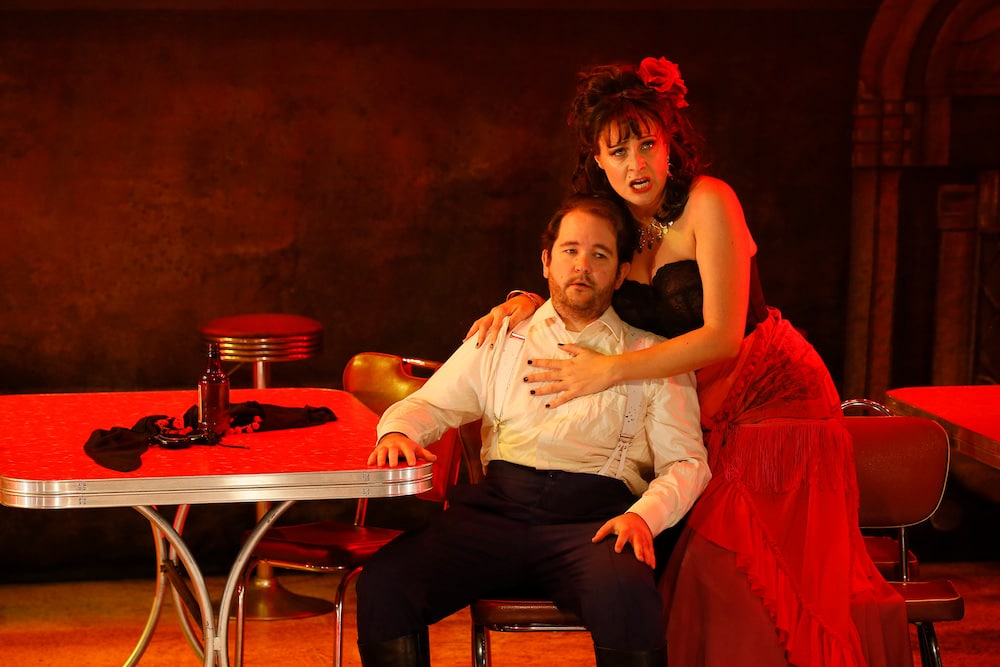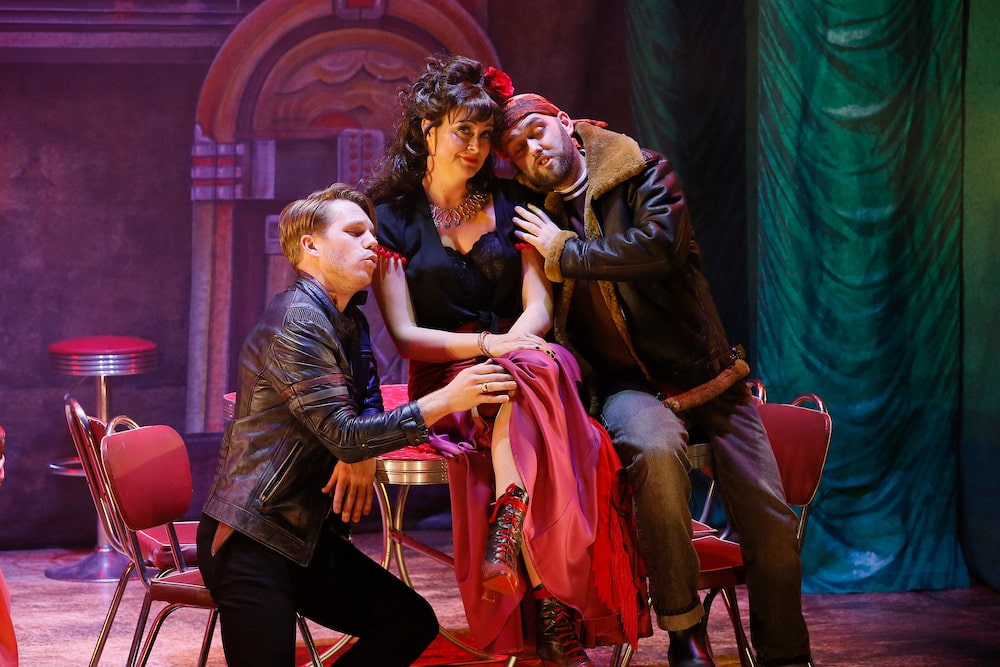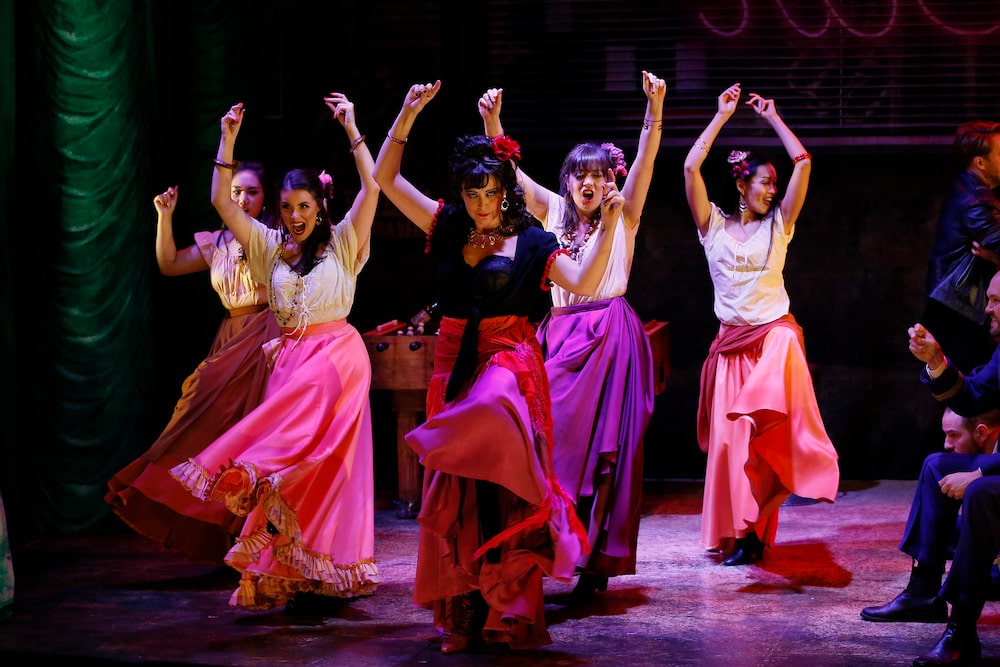Spanish sunshine and passion will warm Canberra audiences this wintry week as Opera Australia brings its touring production of Bizet’s Carmen, one of the most popular works in the repertoire, to town.
Carmen, director Matthew Barclay explains, is one of the most famous femmes fatales in all literature and theatre: a gypsy who “wants to break the rules, and live outside the boundaries of normal human social life. She wants to live as a child of nature.”
Carmen is in love with liberty as much as she is with any man, and demands the right to love whom she chooses and do what pleases her. She is, singer Angela Hogan says, “a very strong woman who is probably a bit before her time – she’s very forward-thinking: a free spirit.”
That leads to disaster when a conventional man falls in love with this unconventional woman. Don José, once a respected soldier with a promising career and a nice, safe girlfriend, deserts his regiment, becomes a brigand, and kills the woman he desires and who destroyed him. At the moment when Carmen’s new lover, the bullfighter Escamillo, kills the bull in the arena, the plaza outside becomes a private arena where Don José kills his tormentor. In that ‘moment of truth’, he becomes both bullfighter and maddened, goaded bull. As other weak men have done, he kills the woman he loves.
“It’s ultimately a story of domestic violence,” Barclay says. “It could take place – and it does take place – in regional towns all over Australia.”
Spain and regional Australia blur in Barclay’s production. Both are harsh environments – dry, hot, desolate. Although set in Franco’s Spain in the 1960s, familiar Australian iconography recurs: showground bleachers, diners, jukeboxes, abandoned drive-ins. Barclay hopes audiences will feel the story is not so far from their own experience.

Although the work ends in murder, Barclay wants to avoid getting “bogged down in the heavy, fatalistic elements of the story – the ominous sense that death is around the corner, this constant feeling that tragedy is experienced at every twist and turn of the story”. He wants to find “lightness in the piece, the moments where there is real enthusiasm and love for life”.
Carmen, in fact, is brilliant entertainment. Much of the opera is light-hearted: choruses of soldiers, cigarette girls, and crowds shout “Olé!”; sultry gypsy beauties dance on tavern tables; smugglers praise the guile of women; and Carmen herself, part seductress, part comedian, laughs and sings, a flower between her teeth. Into this, it mixes the tender sentiment of Don José’s lost love for his fiancée Micaëla, his obsessive jealousy of Carmen, and a brutal killing.
The opera, Barclay says, is full of pageantry and visceral theatricality: characters at the extremes of their desires, bull fights, knife fights, parades, Spanish colour and energy.
And the numbers are catchy, pouring out with almost inexhaustible fertility. Half the world knows them.
“Carmen is packed full of tunes that people who may have never been to the opera, have never thought to listen to opera actively have heard,” Angela Hogan says. “The Geelong Football theme song is the Toréador’s aria. Everybody knows the Habanera whether it’s from cartoons or ads.”
Turn on the television, and Carmen advertises everything from fast food to sports and printers. It’s a stalwart of radio stations; at one point, ABC Classic played highlights from Carmen almost daily. A Tintin BD album opens with a museum guard singing the Toréador song. Adaptations have been set in black America (Carmen Jones, 1955) and South African townships (U-Carmen eKhayelitsha, 2005). Carmen, as Barclay says, is eternally popular, eternally fresh.

But the opera failed in Paris – pulled after 48 poorly attended performances – and wasn’t seen there for seven years. (Meanwhile, the rest of Europe – from Wagner and Nietzsche to Brahms and Tchaikovsky – loved it.)
The opera flopped because it put ‘wanton’ women and criminals onstage at the Opéra-Comique, which upheld decent family values. “The underworld of thieves, gypsies, cigarette girls – at the theatre of families, of wedding parties?” exclaimed the manager. “You would put the public to flight!” Worse, the heroine dies – violently. That was the point where the manager resigned in protest. Critics found the work shockingly realistic, vulgar, even unmusical, and demanded the libretto be rewritten.
And the librettists had already sanitised the piece. In Prosper Merimée’s original novella, Don José is a notorious brigand who murders several people, including his superior officer and Carmen’s husband, while Carmen is a thief and a witch, with several lovers. Characters cheat, lie, steal, and kill – and the whole story is treated as dispassionately as Dashiell Hammett depicts gangsters and their molls. Put that on stage in 1875, and the audience would have rioted.
Poor Bizet died after the 33rd performance, aged only 36, without seeing his masterpiece accepted, or knowing it would be one of the world’s favourite operas.
“If you love opera which has everything, you will love Carmen,” Barclay said. “If you love opera that has big spectacle and big scenes of colour and movement and pageantry, you’ll love Carmen. If you go to opera for soaring emotion and the extremities of human passion – love, frustration, jealous, anger – you’ll find all of that in Carmen as well.
“Carmen will satisfy every kind of opera lover: it’s intellectual; it’s emotional; and it’s really good music theatre entertainment.”
Opera Australia’s production of Bizet’s Carmen will be staged at the Canberra Theatre Centre, Thursday 8 – Saturday 10 July at 7.30pm, and Saturday matinee 1pm.
- Bookings: Adult tickets from $79 (fees may apply). Canberra Theatre Centre Box Office (02) 6275 2700; canberratheatrecentre.com.au; https://opera.org.au/events/national-tour/carmen/
- Local Canberra children will take part in the children’s chorus.



